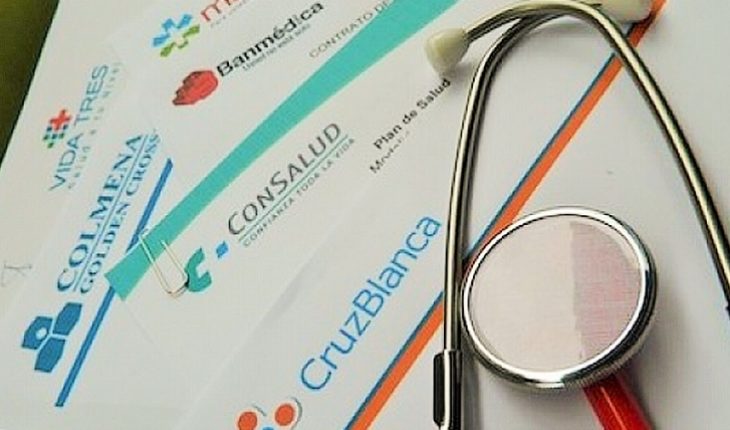The judiciary is forced to assume the defense of hundreds of thousands of citizens, forbidding time and again repeated illegal price increases in their health plans. The Minister of health has declared that isapres do not give for more. Outgoing Health Superintendent has described them as “a miserable” and has promised to join marches No+AFP! and No+ISAPRE! The Government has announced a draft reform bill.
In this context, Cenda has proposed to the country the following set of basic principles – prepared by its team of specialists in health – system reform. They suggest to recover 7% tax to wages which currently is expropriated by the isapres, and adding those resources currently collects which Fonasa and an increased contribution from the national budget, constitute a unique national health fund that advances towards a public system that is universal and free, following the best international practices in this regard.
1. health is the complete state of physical, psychological and social well-being of individuals and communities. Systems of health, on the other hand, are a social response organized against the health of the population process, so that social protection in health aims to address the risk of losing health, which in turn results in economic loss that must be covered socially. In this context, health systems are defined by how they are organized, how the services are provided and are financed. In the financing, it’s resources come from progressive public sources (and not Pocket expenditure) and be grouped together in a process of pooling that allows you to manage the risks of the entire population in a supportive and efficient. Indeed, in countries advanced in terms of health systems, the financing is solidarity and in terms of global meeting of resources occupies the most efficient system possible, i.e. in a single public entity, such as the cases of the United Kingdom, Germany, Canada Spain or Italy.
2. Design created in dictatorship, Chilean and that essentially remains intact, is rather strange at international level. It is funded through general taxes, a mandatory premium social security provided only workers (7%) and unfortunately with a significant level of pocket spending. But, and here is “sui generis” system, allowed people from higher income out of the pool of supportive social risk represented by the Fonasa and deliver 7% to private entities called isapres, which will treat it according to your risk of getting sick preferences and ability to pay. 7%, in this case, fades into an ever-greater material measuring risks of the person and every family who accompany him on a plan that has “chosen” among thousands, or that in fact the isapre has classified it.
3. the 7% contributed by that person will no longer be a fiscal space, will not be included in the budget of the nation, as it is in the public world that enters as income budget of Fonasa. In addition, you never have any feature of social security, because the fact of having these resources does not oblige the isapres to use it, taking into account principles such as the right to health, equity and solidarity, as if it takes place in the public world. What will happened then is that that part of the financing, supply higher in relative terms (because it comes from the higher wages in the economy), will have been expropriated by the health insurance institution and to be used in a private world where the market.
The isapres may continue to call the same way or not, but there will be drastically changed its character. They have stopped using social resources and will depend on your own business risk. Probably they can form complementary and/or supplemental not substitute health insurance, i.e. not replace social security thus created with the formation of this true fund national health.
4. This is the root of the problem, since this “rarity” inequities in access and health outcomes, separating the Chilean in virtually two types of countries population, one of about 18% of the population with a per capita similar to developed country expenditure determines as France or Japan, and another with spending per capita on health similar to that of countries such as Peru and Ecuador. More gross inequities say relationship with the function of subsidy of ultimate Fonasa exerted towards isapres, given the permanent high risks to Fonasa expulsion, when people grow old and decrease revenues, so that they can no longer to finance his plan and when are really going to be sick. It is Fonasa who receives them at cost of all Chileans who have been there all the time and that will be solidarity with newcomers, while their contributions were with the isapres and were not shared in this supportive pool before.
5. the natural solution to this problem is the recovery. That is, retrieve all financing public for the whole of society. That 7% of all workers will become part of Fonasa resources to constitute a single health fund for Chile, i.e., a truly “national” and universal Fund to finance health. This will add to the public purse close to one percentage point of GDP every year, at least, and will constitute a fund national and universal that will bring together all the resources available for health, tax contribution and all quotations, which may exploit the advantages in solidarity and efficiency that this entails, and which has proven international experience. This will be the starting point towards a free health cover for a significant increase in public investment in health, to the satisfaction of the health needs of the population, while families must face access barriers, as it is the expense of pocket.
6 will have to organize a network of services for all, with a single fund paying that can help to shape the system, so that it tends to give comprehensive services to individuals and communities, integrated and based on a first level of care and the strategy of aten primary tion of health for all. A fund like this, strengthened its capabilities, may also negotiate more favorable terms with suppliers of services that integrate the above-mentioned networks and exercise economies of scale, the social savings in administration and management of the high intelligent and accurate costs. The conditions and rights of the people, expressed in amounts of grant/funding recipients from the bottom when they get sick, will be the same for everyone and may increase over time as they will be financially covering the needs through increased public spending, until you reach at least 6 percent of GDP as recommended and Chile is committed within the framework of UN health agencies.
7. this decision to create this unique Fund implies a great strengthening of the Fonasa as fundraiser and single health payer, to support the model of health care and exercise negotiations appropriate providers, including private ones that are available to form part of the network of health care regulated publicly. One task of the Ministry of health shall file in the control and organisation of the provision, while governance and capacity adequate to ensure transparency and power regulation.
8 there is a wealth of international experience of use of these systems and of transformation and transition towards them. The cases already mentioned and consolidated many years ago, may also have connotations of consolidation most recent cases, as Korea of the South, Estonia and Costa Rica and Uruguay in the region.
The isapres may continue to call the same way or not, but there will be drastically changed its character. They have stopped using social resources and will depend on your own business risk. Probably they can form complementary and/or supplemental not substitute health insurance, i.e. not replace social security thus created with the formation of this true fund national health.
Poured in this op-ed content is the sole responsibility of the author and do not necessarily reflect the editorial line nor the counter position.





